The Boy in the Striped Pajamas
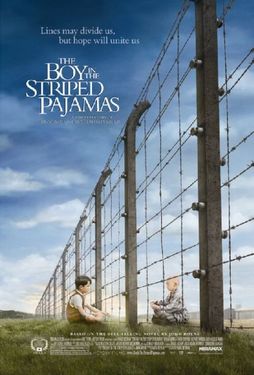
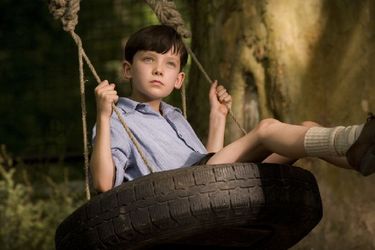 There is a brilliant and quiet little scene during the opening credits which sets up one of the main themes of the film. Eight-year-old Bruno (Asa Butterfield) and his friends are joyfully running and playing down the streets of Berlin. At one point, they pass by some Jews who are being herded at gun point into trucks to take them into concentration camps. Bruno and his friends do not even notice what is going on right in front of them, and simply go running by playing in front of those who we know have been given a death sentence. It's a perfectly staged moment, because it does not draw attention to itself. The camera is focused on Bruno's joy, not the misery going on around him. As soon as young Bruno returns home, he learns that his father (David Thewlis) has been made the head commandant of a concentration camp, and that the family must move to a home nearby the camp until the war is over. Bruno does not want to leave his friends and school behind, but his mother (Vera Farmiga) tries to put on a good face, and make the best of the situation for young Bruno and his older sister Gretel (Amber Beattie).
There is a brilliant and quiet little scene during the opening credits which sets up one of the main themes of the film. Eight-year-old Bruno (Asa Butterfield) and his friends are joyfully running and playing down the streets of Berlin. At one point, they pass by some Jews who are being herded at gun point into trucks to take them into concentration camps. Bruno and his friends do not even notice what is going on right in front of them, and simply go running by playing in front of those who we know have been given a death sentence. It's a perfectly staged moment, because it does not draw attention to itself. The camera is focused on Bruno's joy, not the misery going on around him. As soon as young Bruno returns home, he learns that his father (David Thewlis) has been made the head commandant of a concentration camp, and that the family must move to a home nearby the camp until the war is over. Bruno does not want to leave his friends and school behind, but his mother (Vera Farmiga) tries to put on a good face, and make the best of the situation for young Bruno and his older sister Gretel (Amber Beattie).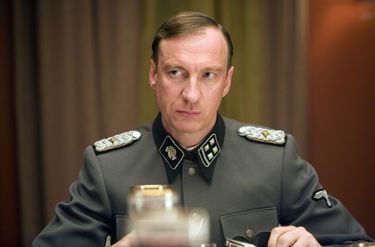 The house that the family is moved to is an unwelcoming one with high walls and soldiers just outside the main gate. With no friends and no one to talk to other than his stuffy at-home tutor, Bruno quickly starts looking for ways to escape and explore outside the wall surrounding his home. He finds a door that leads to a path through the woods out back. Following the path, he comes upon an electrified fence, where a boy about his age in "striped pajamas" sits on the other side. The boy is Shmuel (Jack Scanlon), and we know that he is a prisoner within Bruno's father's camp. But young Bruno does not quite understand the situation, and in a way, neither does Shmuel. They bond by talking to each other through the fence, and before long, the child on the outside of the fence is beginning to realize his father's actions. Shmuel looks nothing like the prisoners he sees in propaganda films, where the Jews are shown doing fun activities and being treated well when they're not at work. The boy Bruno talks to is withered, hungry, and losing hope. He begins to see his father in a more questionable light, while meanwhile, his mother struggles on her own to come to terms with the horrors going on so close to home.
The house that the family is moved to is an unwelcoming one with high walls and soldiers just outside the main gate. With no friends and no one to talk to other than his stuffy at-home tutor, Bruno quickly starts looking for ways to escape and explore outside the wall surrounding his home. He finds a door that leads to a path through the woods out back. Following the path, he comes upon an electrified fence, where a boy about his age in "striped pajamas" sits on the other side. The boy is Shmuel (Jack Scanlon), and we know that he is a prisoner within Bruno's father's camp. But young Bruno does not quite understand the situation, and in a way, neither does Shmuel. They bond by talking to each other through the fence, and before long, the child on the outside of the fence is beginning to realize his father's actions. Shmuel looks nothing like the prisoners he sees in propaganda films, where the Jews are shown doing fun activities and being treated well when they're not at work. The boy Bruno talks to is withered, hungry, and losing hope. He begins to see his father in a more questionable light, while meanwhile, his mother struggles on her own to come to terms with the horrors going on so close to home.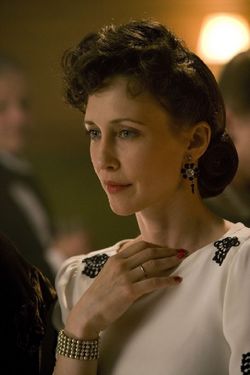 Based on the novel by John Boyne, The Boy in the Striped Pajamas gives us an innocent and somewhat naive, but no less powerful, look at a human tragedy. The story is told entirely from the point of view of a child who does not fully understand what he sees and hears around him. The concentration camp is a "farm", the uniforms the prisoners within wear are "pajamas", the numbers on their uniforms are part of a game, and young Bruno considers his new friend lucky that he gets to be around so many people, while he's stuck in his house all the time. It may be a bit of a stretch that a boy Bruno's age who is the son of a head Nazi officer would not be aware of what's going on around him until just now, but it didn't bother me too much while watching it. Writer-director Mark Herman forces us to see things through the eyes of Bruno, so that even though we are surrounded by one of the worst moments in history, they are mainly kept in the background. Even if some of the scenes between the two children come across as being somewhat manipulative, the natural performances by Asa Butterfield and Jack Scanlon keep things in check. Young Scanlon in particular gives a very understated performance as a boy who knows he has been locked up, but doesn't understand why, or what happened to some of his friends and loved ones who went into the camp with him, but he hasn't seen since then.
Based on the novel by John Boyne, The Boy in the Striped Pajamas gives us an innocent and somewhat naive, but no less powerful, look at a human tragedy. The story is told entirely from the point of view of a child who does not fully understand what he sees and hears around him. The concentration camp is a "farm", the uniforms the prisoners within wear are "pajamas", the numbers on their uniforms are part of a game, and young Bruno considers his new friend lucky that he gets to be around so many people, while he's stuck in his house all the time. It may be a bit of a stretch that a boy Bruno's age who is the son of a head Nazi officer would not be aware of what's going on around him until just now, but it didn't bother me too much while watching it. Writer-director Mark Herman forces us to see things through the eyes of Bruno, so that even though we are surrounded by one of the worst moments in history, they are mainly kept in the background. Even if some of the scenes between the two children come across as being somewhat manipulative, the natural performances by Asa Butterfield and Jack Scanlon keep things in check. Young Scanlon in particular gives a very understated performance as a boy who knows he has been locked up, but doesn't understand why, or what happened to some of his friends and loved ones who went into the camp with him, but he hasn't seen since then.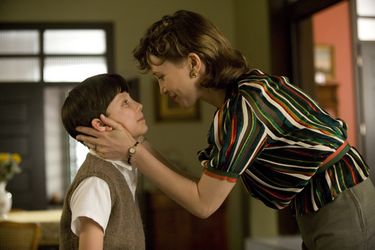 If these moments between the two children made up a majority of the picture, you'd probably be reading a rave review. Unfortunately, the movie has to keep on turning to scenes within Bruno's house, which should be emotionally satisfying, but suffer from a surprising lack of emotion. Despite a noteworthy and highly emotional performance by Vera Farmiga as the mother, her dealing with the realization of what her husband is truly doing never quite hits as hard as it should, because the movie seems to keep on cutting away from her. She's kept in the background for most of the scenes, while we get Bruno trying to make sense of his tutor's lessons that all Jews are evil, and trying to sort through the things he sees and hears from his father and propaganda films, and what he sees for himself whenever he visits Shmuel. The drama here is oversimplified, and sometimes heavy handed. (Most of Bruno's internal struggle is dealt with him wandering through the house while we hear the voice of his father and others echo in his head in voice over.) We keep on waiting for the scene where tensions within the family will explode, but it never comes. Everything is so strangely muted, even the argument that Bruno's parents have with one another is kept off camera.
If these moments between the two children made up a majority of the picture, you'd probably be reading a rave review. Unfortunately, the movie has to keep on turning to scenes within Bruno's house, which should be emotionally satisfying, but suffer from a surprising lack of emotion. Despite a noteworthy and highly emotional performance by Vera Farmiga as the mother, her dealing with the realization of what her husband is truly doing never quite hits as hard as it should, because the movie seems to keep on cutting away from her. She's kept in the background for most of the scenes, while we get Bruno trying to make sense of his tutor's lessons that all Jews are evil, and trying to sort through the things he sees and hears from his father and propaganda films, and what he sees for himself whenever he visits Shmuel. The drama here is oversimplified, and sometimes heavy handed. (Most of Bruno's internal struggle is dealt with him wandering through the house while we hear the voice of his father and others echo in his head in voice over.) We keep on waiting for the scene where tensions within the family will explode, but it never comes. Everything is so strangely muted, even the argument that Bruno's parents have with one another is kept off camera.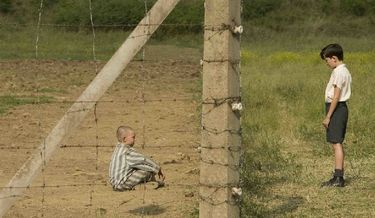
See the movie times in your area or buy the DVD at Amazon.com!






0 Comments:
Post a Comment
<< Home